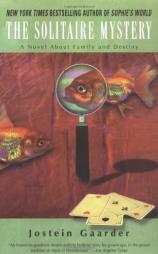Reading Group Guide
Discussion Questions
The Solitaire Mystery

1. Despite the fact that the novel recounts the progress of several journeys, Hans Thomas begins his story with these words: "My advice to all those who are going to find themselves is: Stay exactly where you are" (p. 9). How has his experience inspired him to make this recommendation? Do you think he will be content as an adult with a life of little adventure? Are you adventurous? Why, or why not?
2. Hans Thomas is afraid that his wife may "drown in a fashion fairy tale" (p. 10). What other characters are in danger of metaphorically "drowning," and what is similar about the way each is saved?
3. Do you agree with Hans Thomas's father that very few people are interested in probing the deep mysteries of life? If yes, why do you think this is so? If no, why do you think he believes this to be true? Do you consider yourself a philosopher/ joker? If yes, what are the difficulties and rewards of living the life of "a fool" --- the one who "sees too deeply and too much" (p. 270)?
4. Reread Hans Thomas's father's lecture on "the ravages of time" (pp. 244-248). How does the concept of the soul counteract the ravages of time, and why do you think so many of the world's religions incorporate this idea in one way or another? What does the Joker have in common with the soul, and does this explain Hans Thomas's father's attraction to the Joker?
5. Why does Hans Thomas consider his moment of maturation to be his realization that his father dreads meeting his mother again? What do you remember to be the incident that finally made you an adult? Do you think the coming-of-age process must always involve sorrow? Why, or why not?
6. How has Ludwig's and Stine's "original sin" affected subsequent generations of the family? Compare their tragic story to that of Oedipus (pp 203-207). What is meant by the King of Spades's pronouncement: "The one who sees through destiny must also live through it" (p. 256)? Do you think it is possible to escape one's destiny?
7. Discuss the significance of the Rainbow Soda throughout the novel. How can something so seductively delicious have such drastic side effects? Could Hans Thomas and the other major characters have made their discoveries without it? How can "getting drunk on sensory experience" (p. 325) contribute to an individual's taking life for granted?
8. Did you find reading this "fairy tale" an interesting new way to look at the world? What other books (or films) have strongly influenced your philosophy of life? Are there things that fiction can accomplish in this regard that nonfiction cannot? Did the novel provide you with a "close encounter of the fourth kind" (see pp. 94-96) and leave you with a renewed sense of wonder?
9. Discuss the meaning of the Ace of Hearts's declaration: "The inner box unpacks the outer box at the same as the outer box unpacks the inner" (p. 121). How does this idea illuminate the connection between Hans Thomas's trip to Greece and the experience recounted in the sticky-bun book? How does the author enhance the reader's enjoyment and understanding of the novel by employing clever literary devices (e.g. using palindromes and backward speaking , constructing characters and chapters from decks of cards)?
10. Do you believe human beings to be "lively, living fantasies" (p. 222) just like Frode's card figures? If so, what is the origin of these fantasies --- God? Our families? Destiny? And what are the dangers or benefits inherent in not knowing who is dealing the cards in the "great solitaire" (p. 302)?
11. Why do you think the author makes the sticky-bun book disappear at the end of the novel? How does this contribute to the "unsolved" nature of The Solitaire Mystery, and did you find the novel's conclusion appropriate? Satisfying? Convincing?
The Solitaire Mystery
- Publication Date: November 1, 1997
- Mass Market Paperback: 336 pages
- Publisher: Berkley Trade
- ISBN-10: 042515999X
- ISBN-13: 9780425159996






